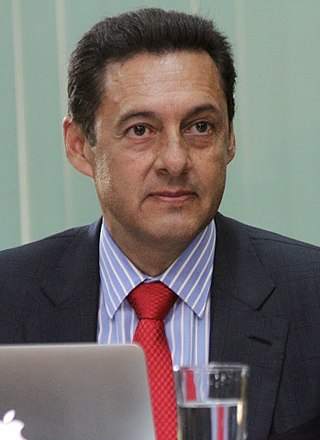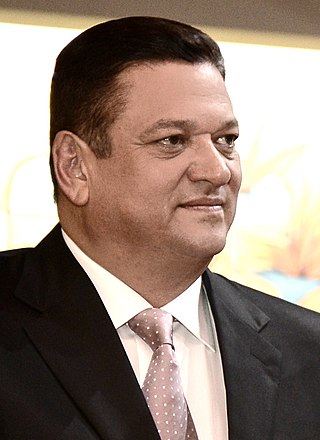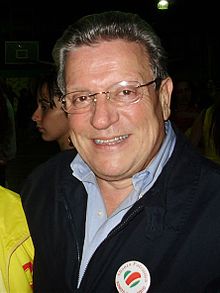
The politics of Costa Rica take place in a framework of a presidential, representative democratic republic, with a multi-party system. Executive power is exercised by the president and their cabinet, and the President of Costa Rica is both the head of state and head of government. Legislative power is vested in the Legislative Assembly. The president and 57 Legislative Assembly deputies are elected for four-year terms. The judiciary operates independently from the executive and the legislature, but is involved in the political process. Costa Rica has a strong system of constitutional checks and balances. Voting is compulsory, but this is not enforced.

Luis Alberto Monge Álvarez was the President of Costa Rica from 1982 to 1986. He also served as Costa Rica's first Ambassador to Israel from 1963 until 1966.

The National Liberation Party, nicknamed the verdiblancos, is a political party in Costa Rica. The party is a member of the Socialist International. Social-democratic by statute, the party has a few internal factions, including liberals, Third Way supporters, centrists, and social conservatives.

The Citizens' Action Party is a political party in Costa Rica.

The Social Christian Unity Party is a centre-right political party in Costa Rica.

Antonio Álvarez Desanti is a Costa Rican politician, lawyer and businessman who has served twice as President of the Legislative Assembly. He was National Liberation Party candidate for the 2018 Costa Rican general election.

Johnny Francisco Araya Monge is a Costa Rican politician. He was the mayor of the country's capital San José from 1998 to 2013 and again since 2016. He was also the co-president of the United Cities and Local Governments (UCLG) from 2010 to 2013. He is a member of the National Liberation Party (PLN) and was a presidential candidate in the 2014 election.

General elections were held in Costa Rica on 7 February 2010. The ruling party before the election, the center-left National Liberation Party, put forward former Vice-President Laura Chinchilla as its presidential candidate, while the libertarian, Movimiento Libertario nominated former legislator Otto Guevara. Opinion polls before voting started consistently put Chinchilla as the front-runner, a trend confirmed in the election-night count, which showed her garnering 46.76% of the vote.

General elections were held in Costa Rica on 2 February 1986. Óscar Arias of the National Liberation Party won the presidential election, whilst his party also won the parliamentary election. Voter turnout was 82%.

General elections were held in Costa Rica on 4 February 1990. Rafael Ángel Calderón Fournier of the Social Christian Unity Party (PUSC) won the presidential election, whilst his party also won the parliamentary election. Voter turnout was 81.8%.

General elections were held in Costa Rica on 6 February 1994. José María Figueres of the National Liberation Party won the presidential election, whilst his party also won the parliamentary election. Voter turnout was 81%.

General elections were held in Costa Rica on Sunday, 2 February 2014 to elect a new president, two vice presidents, and 57 Legislative Assembly lawmakers. In accordance with Article 132 of the constitution, incumbent President Laura Chinchilla Miranda was ineligible to run for a second consecutive term.

Luis Guillermo Solís Rivera is a Costa Rican politician and educator who was the 47th President of Costa Rica from 2014 to 2018. He is a member of the Citizens' Action Party (PAC).

A primary election was held among the members of Costa Rica's then ruling National Liberation Party (PLN) on June 7, 2009 in order to choose the PLN's nominee for presidency in the 2010 general election. The two main candidates for the nomination were then vice-president Laura Chinchilla and San José Mayor Johnny Araya. Former security minister Fernando Berrocal also ran a basically testimonial candidacy. PLN's main rival party, PAC, ran its own convention a month before.

A primary election was held among the members of Costa Rica’s National Liberation Party (PLN) on June 3, 2001 in order to choose PLN’s nominee for presidency in the 2002 general election. PLN was then the main opposition party facing then in government Social Christian Unity Party. This, as was common since the 70s, was an open primary and as such all Costa Ricans could vote in it with the only requirement be signing membership of the party moments before entering the polls.
Doris Yankelewitz Berger was a Costa Rican artist, politician, political activist, and member of the National Liberation Party (PLN). She served as the First Lady of Costa Rica from 1982 to 1986 during the presidency of her then-husband, President Luis Alberto Monge. She was the nation's first Jewish First Lady.

The Reform State or Reformist State is the period in 20th-century Costa Rican history when the country switched from the uncontrolled capitalism and laissez-faire approach of the Liberal State into a more economically progressive Welfare State. It began about 1940 during the presidency of social reformer Rafael Angel Calderón Guardia, and ended in the 1980s with the neoliberal reforms inherent in the Washington Consensus that began after the government of Luis Alberto Monge.

Figuerism or Figuerismo is a political and ideological movement in Costa Rica of social democracy and democratic socialism initiated by José Figueres Ferrer, who exercised the presidency of Costa Rica on three occasions; as de facto ruler after the Costa Rican revolution between 1948 and 1949, and then as democratically elected president twice: 1953–1958 and 1970–1974. Several Costa Rican political parties proclaim themselves as continuators of figuerism and as their most faithful representatives, among them the National Liberation Party, Citizens' Action Party and the Patriotic Alliance, all of whom pay homage to the figure of José Figueres and have personalities in their ranks close to the former president Figueres and of figuerist extraction.

General elections were held in Costa Rica on 6 February 2022, to elect the president, two vice-presidents, and all 57 deputies of the Legislative Assembly. As none of the presidential nominees obtained at least 40% of the votes, a runoff was held on 3 April 2022, between the top two candidates, José María Figueres and Rodrigo Chaves Robles.

A Just Costa Rica is a Costa Rican political party. It nominated engineer Rolando Araya Monge as a presidential candidate for the 2022 Costa Rican general election.


















